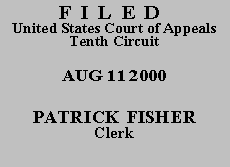
UNITED STATES COURT OF APPEALS
FOR THE TENTH CIRCUIT
| LOUIS J. ARNAU, II,
Plaintiff-Appellant, v. KENNETH S. APFEL, Commissioner, Social Security Administration, Defendant-Appellee. |
|
Filed August 11, 2000
The members of the hearing panel have considered appellant's arguments on the merits of this court's disposition of his appeal, and conclude that the original disposition was correct because appellant did assert a legal issue on appeal not presented to the district court.
Appellant argued before the district court that the ALJ erred by not including his sleep apnea in her evaluation of whether he met the requirements of Listing § 12.02 with respect to his attention deficit/hyperactivity disorder (ADHD), and asserted that his ADHD would have been considered severe enough to meet this ADHD listing if the ALJ had factored in the cognitive problems caused by his sleep apnea. He did not argue before the district court that ALJ failed to consider whether the combined effects of the two asserted impairments, ADHD and sleep apnea, create a medically severe impairment in combination. Nor did he cite to the regulation or decisions which obligate an ALJ to consider impairments in combination. See Hargis v. Sullivan, 945 F.2d 1482, 1491 (10th Cir. 1991) (holding that an ALJ "must consider the combined effects of impairments that may not be severe individually, but which in combination may constitute a severe medical disability"); see also 20 C.F.R. § 404.1523.
On appeal, appellant added to the argument raised below by also claiming that the ALJ failed to consider how his asserted lack of "cognitive vigilance" caused by his sleep apnea "worked in combination with [his] ADHD to make both conditions more disabling together than they would ordinarily be separately." Appellant's Br. at 22. This "in combination with" argument is new and legally distinct from his argument before the district court because resolving the legal issue of whether appellant met the ADHD listing, as argued below, does not resolve the separate issue of whether his impairments, while not severe individually, were disabling when considered in combination, as argued on appeal.
Therefore, the petition for rehearing is GRANTED in part to modify footnote one of the order and judgment, and is DENIED in all other respects. A copy of the corrected order and judgment is attached.
Entered for the Court
PATRICK FISHER, Clerk of Court
By:
Keith Nelson
Deputy Clerk

| LOUIS J. ARNAU, II,
Plaintiff-Appellant, v. KENNETH S. APFEL, Commissioner, Social Security Administration, Defendant-Appellee. |
|
Plaintiff Louis J. Arnau, II, appeals the district court's judgment affirming the Commissioner's decision to deny his application for disability benefits. He alleges disability since February 28, 1994, due to sleep apnea, attention deficit/hyperactivity disorder (ADHD) and heart palpitations. Following a hearing before an administrative law judge (ALJ), the ALJ determined that although plaintiff could not perform his past work, he retained the residual functional capacity (RFC) to perform a significant number of alternate jobs available in the national economy, and denied benefits at step five of the five-step evaluation process. See Williams v. Bowen, 844 F.2d 748, 750-52 (10th Cir. 1988) (discussing five steps). The Appeals Council denied review, making the ALJ's decision the final decision of the Commissioner. Based upon the findings and recommendations of the magistrate judge, the district court affirmed.
On appeal, plaintiff contends the ALJ failed (1) to evaluate the effects of his sleep apnea under the criteria of Listing 12.02, see 20 C.F.R. Pt. 404, Subpt. P, App. 1, § 12.02, which he asserts is required by Listing 3.00(H), see id. at § 3.00(H)(1); and (2) to accord proper weight to the opinion of his treating physician, who opined that plaintiff was disabled because he could not be supervised closely enough to make him a profitable employee.
We review the Commissioner's decision on the whole record to determine only whether the factual findings are supported by substantial evidence and the correct legal standards were applied. See Qualls v. Apfel, 206 F.3d 1368, 1371 (10th Cir. 2000). We may not reweigh the evidence or substitute our judgment for that of the Commissioner. See id. We have carefully reviewed the record on appeal, as well as the briefs submitted by the parties. Applying the standards set out above, we AFFIRM the denial of benefits for substantially the reasons stated in the magistrate judge's findings and recommendations dated November 18, 1998, and the district court's order dated July 20, 1999.
Entered for the Court
Circuit Judge
*. This order and judgment is not binding precedent, except under the doctrines of law of the case, res judicata, and collateral estoppel. The court generally disfavors the citation of orders and judgments; nevertheless, an order and judgment may be cited under the terms and conditions of 10th Cir. R. 36.3.
1. Plaintiff also contends the ALJ erred in failing to properly consider sleep apnea in combination with his adult ADHD when determining that plaintiff did not meet the requirements of a listed impairment. The Commissioner asserts this issue was not raised before the district court. We agree. See Berna v. Chater, 101 F.3d 631, 632 (10th Cir. 1996) (appellate review "is limited to the issues the claimant properly preserves in the district court and adequately presents on appeal").